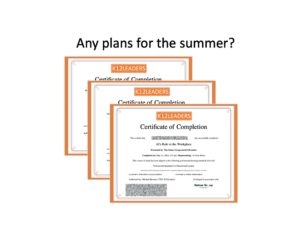Don’t fight imposter syndrome
And don’t give in either
Mar 29, 2025
Imposter syndrome is an example of a larger phenomenon, and when we fight it, we actually make it stronger.
Our limbic brains through 100’s of millions of years of development evolved to keep us safe. In hundredths of a second we recognize danger, we decide on some action, often freeze, flight, or fight and then we mobilize all of our senses and higher level cognitive abilities to carry out and defend that action.
In the modern world, sometimes the way we have made sense of a situation and then our reactions are counterproductive. Shirzad Chamine calls that part of us that makes those decisions the Judge and Phil Stutz calls that or Part X.
Part X or the Judge exist to maintain the status quo by making us so miserable that we don’t take action and providing us with a story that this will keep us safe.
“I’m not worthy.” “No one could love me.” “I’m not good enough.” Are a few examples of the infinite statements they can generate to freeze us.
And these saboteur parts of our brains are wily, the more we fight them, the stronger they become.The harder they fight back.
Whatever we do contains risks. If we are about to receive something good, the risk is that it will end. If we are about to do something we want to do, the risk could be that it will not be as good as you expect, or that something might go wrong. If a person says they love us, they might end up hurting us. Alerting us to risk is one of the jobs of the limbic parts of the brain.
Having been alerted about the risk, the other parts of the brain to create a story, in this case the “I’m not worthy” or “I am an imposter” story.
That story reflects our brain’s need to make sense of a situation quickly with very little information. We often then act on that story; we feel unworthy, we get anxious or angry, we may flee or strike out.Subscribe
We can overcome these impulses, but not by fighting them.
How?
Glad you asked.
1: Name it.
This is not you. This is your saboteur brain, your Part X, or your Judge. The first step is to call it by what it is, “This is my saboteur brain trying to protect me.”
2: Acknowledge the usefulness of being alerted.
You can mentally say to yourself, “thank you for alerting me” or something similar.
3. Focus on something pleasurable.
We tend to focus on the message or story, but when we have named the story and then focus on something else, that story loses its emotional power. Sometimes we can just choose to smile and feel light. Maybe we can remember some time when we were happy or confident. Maybe we need a longer distraction like mindfulness or listening to music.
4: Affirm the positive.
Mentally say something positive. Such as:
- I am strong and resilient. I can handle this.
- I don’t need to be perfect to be worthy.
- I am worthy of success and recognition.
Or something else. It doesn’t matter much, just say something positive about yourself to yourself and move on.
NAFA : Name it, Acknowledge it, Focus on happiness. Affirm the positive.
Replacing imposter syndrome with confidence doesn’t have to be hard, and it doesn’t have to be a battle.
That turns out NAFA is a lot more effective than fighting imposter syndrome.
And like taking a shower when you get dirty, when the grime comes back, just NAFA it again.
MindShifting: Stop Your Brain from Sabotaging Your Happiness and Success is available on Amazon.






